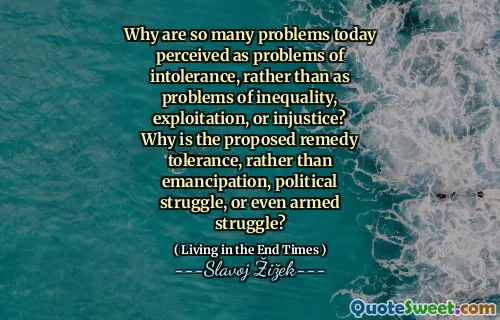"Living in the End Times" is a thought-provoking book by Slavoj Žižek that explores contemporary socio-political issues through the lens of various ideologies and global crises. Žižek argues that we are currently facing multiple existential threats that challenge the very fabric of society, including ecological catastrophes, economic instability, and rising nationalism. He examines how these crises intertwine and culminate in a sense of dread about the future, leading to a feeling of living in apocalyptic times.
The author delves into the ideologies that shape our understanding of these crises, critiquing both capitalism and communism while suggesting that existing structures may not be adequate to address the complex problems at hand. Žižek emphasizes the importance of radical thought and action to transcend the limitations imposed by traditional political paradigms. He encourages readers to embrace uncertainty and rethink their engagement with the world to navigate these turbulent times effectively.
Throughout the book, Žižek employs a mix of philosophy, psychoanalysis, and cultural commentary to shed light on the human experience amidst chaos. He reflects on how people react to crises, often clinging to old beliefs or looking for new saviors, and challenges readers to confront their fears and desires. By doing so, Žižek aims to inspire a sense of hope and possibility for reimagining our future, even in the face of what seems like the end times.
More »
Today Birthdays
1729 -
Edmund Burke
1949 -
Haruki Murakami
1954 -
Howard Stern
1876 -
Jack London
1993 -
Zayn Malik
1951 -
Kirstie Alley
1863 -
Swami Vivekananda
1923 -
Alice Miller
1987 -
Naya Rivera
1825 -
Brooke Foss Westcott
1944 -
Joe Frazier
1951 -
Rush Limbaugh
1964 -
Jeff Bezos
1978 -
Jeremy Camp
1628 -
Charles Perrault
1856 -
John Singer Sargent
1970 -
Kaja Foglio
1953 -
Rick Santelli
1986 -
Gemma Arterton
1968 -
Raf Simons
1958 -
Christiane Amanpour
1966 -
Olivier Martinez
1996 -
Ella Henderson
1917 -
Maharishi Mahesh Yogi
1949 -
Ottmar Hitzfeld
1928 -
Ruth Brown
1968 -
Heather Mills
1946 -
George Duke
1968 -
Rachael Harris
1923 -
Ira Hayes
